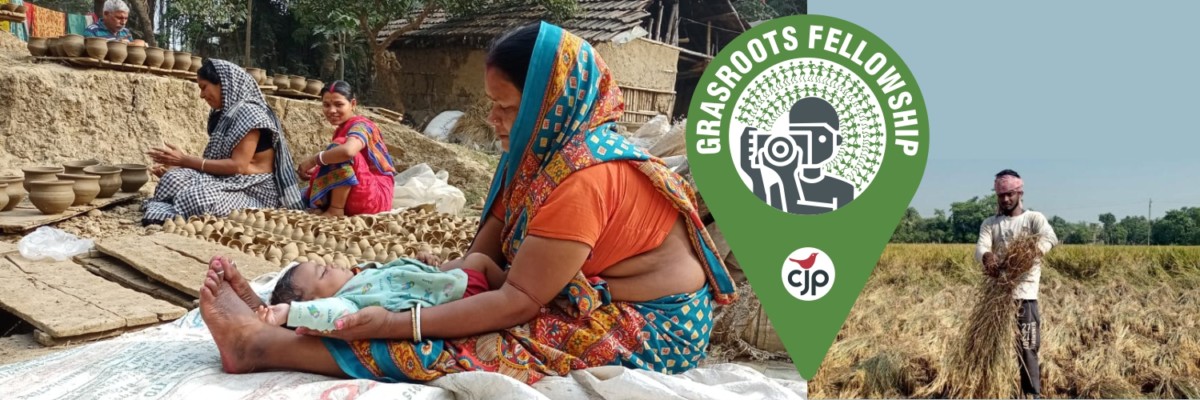
Citizens for Justice and Peace

CJP GRASSROOTS FELLOWSHIP 2026-27
The fellowships are awarded to young men and women, from the communities with whom we work closely. These include migrant workers, Adivasis, forest workers and the urban poor. The fellowship program hopes to build a community of on ground researchers and community leaders who are passionate about exploring issues that impact them, and are equipped to deal with legal and administrative issues that impact their legal, Constitutional rights.
They are trained by CJP’s team of experts to research, document economic activities like farming, forest produce collections, market interactions; legal and Constitutional rights as a collective. CJP offers them mentorship, legal support, knowledge of human rights, legal aspects of tribal rights and more. We aim to strengthen their struggle and explore solutions for their fight to claim back their land and livelihood. Donate Now to empower our grassroots fellows.
CURRENT CJP FELLOWS
Mohamed Ripon Sheikh
I hail from Birbhum district and have a B.Sc degree from the Burdwan University. I love trivia and am passionate about seeking “unknown information of World History”. That is what helps me earn the medals at various university and state level quiz championships and youth festivals. I like to speak from stage at public events, and community gatherings. One day, I hope to represent my community, at the national, and global level. However, for now, my immediate goal is to find a job so I can support my parents financially.
Previous CJP Fellows
Fazlur Rahman Ansari
I am a weaver from Varanasi. I am also a social worker. For many years now I have been aware of the social and political problems faced by the weaving community in Uttar Pradesh. In 2006 when the ruling party scrapped the flat rate power subsidy for looms in Uttar Pradesh there was a statewise protest. In Varanasi we protested for as long as three months and as a result the state government was made to bring back the power subsidy. I am proud to say that I was one of the people who was at the forefront of this battle. Our struggles are far from over. We need to educate the weaving community on their rights as workers. I believe that through public awareness campaigns there is a need to organise and agitate, especially for the rights of women weavers. I strongly believe that a country only prospers when all its citizens, irrespective of who they are, prosper.
Shaba
My family lived in Garhi Pukhta a small town in Muzzaffarnagar, Uttar Pradesh; a town only few people know. After my birth they moved to Delhi to give me a life worth living. I belong to the muslim community where more often than not, a girls education is no considered a priority. But I consider myself very lucky. I have always known what I want to do. My dream has always been to become a teacher. Which is why after finishing my 12th standard exams I decided to pursue a Diploma in Elementary Education and I have also passed the Central Teacher Eligibility Test (CTET).
My plan is to pursue a career as a teacher. This will provide me with the opportunity to mould young and healthy minds. But my work won't stop there. I also want to make education accessible to the underprivileged population in our country as they struggle everyday to sustain their families. I want to be part of a system that works towards a welfare state and make my parents proud.
Tinku Sheikh
I am the middle one of three brothers, we were all born and raised in a small village in West Bengal. All three of us began to work for other villagers while we were still in school. By the time I reached the 8th standard, I realised it won’t be possible to continue my education owing to the economic condition of our family. We were poor and I had to earn better to survive. So I left for Mumbai in 2010 hoping to get work and give my family a better life. After staying there for four months, I returned home for a month, but soon realised my parents are struggling to make ends meet. So my elder brother and I left home again to earn. We had to come back after five more months, as our grandfather had died. While living and working in the village, we got married and started living separately with our individual families. But soon, I decided to move back to Mumbai to earn better, and eventually start my own poultry farm.
Meer Hamza
I was born in a jungle. Literally! I hail from the pastoral Van Gujjar hill tribe and was born on the outskirts of the Rajaji National park in Uttarakhand. I am now pursuing a Masters degree in Social Work, and I feel a deep affinity to nature. I hail from a nomadic tribe of people who migrate according to seasons and rear milch animals, selling milk for a living. For over three years now, I have been working actively as a social worker for my Van Gujjar community. I help them access basic education, teach them how to retain their culture and most importantly know their rights. I created a youth group, and am educating them about the rights of forest dwelling communities, citizenship laws, conservation and security issues. I am also researching traditional forest produce, so I can enable my community to market them effectively while retaining the balance of nature.
Mamta Pared
My name is Mamta Pared. I am an Adivasi hailing from the Warli community, and I live with my family in Nimbavali village in Palghar district. My mother is unlettered, while my father was educated up to the fourth standard. After they got married, my parents started working together at a brick kiln. Every year our family used to migrate for employment and lived near brick kilns six months out of twelve months. We are five siblings, the youngest was born when I was five years old. As the eldest daughter in the family, I was responsible for caring for my siblings, and also helped with household chores. I had to skip school frequently and stay home to take care of my brother. But I studied hard, passed scholarship exams, stayed in a government hostel, even borrowed money to pay college fees. I eventually earned a Bachelor’s degree in Mass Media.















